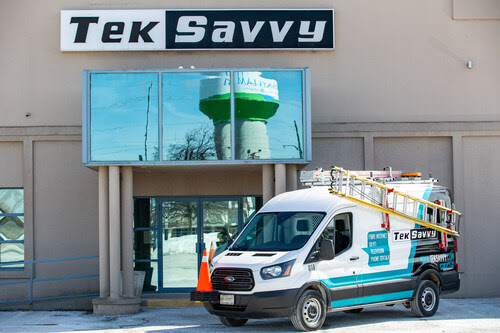
By Ahmad Hathout
OTTAWA – Representatives from the country’s largest independent internet service provider spoke directly with CRTC chair Vicky Eatrides in February about acquisitions that have swept the industry in recent months, according to documents obtained by Cartt.
Andy Kaplan-Myrth, TekSavvy’s vice president of regulatory and carrier affairs, sat down with the head of the regulator to talk about an “overview of market conditions for retail internet services,” including “observed pricing trends,” and a discussion “regarding the recent acquisitions in the market,” according to an outline of the morning meeting held on February 15 and obtained via access to information legislation.
The conversation also encompassed the ISP’s operations and investments in fibre, the outline said.
Eatrides thanked Kaplan-Myrth in an email for “further information about TekSavvy and about the challenges facing independent competitors. We appreciate you taking the time to follow up and look forward to connecting again.”
TekSavvy has blamed the CRTC’s 2021 decision to make permanent higher wholesale internet rates – the money that third parties pay to lease network space from the large ISPs – for a slew of acquisitions of smaller players.
Those acquisitions include Bell’s purchase EBOX and Distributel; Videotron’s purchase of VMedia, Telus’s purchase of Start and Altima, and Cogeco buying Oxio’s internet business.
In fact, TekSavvy had prepared a two-page document that was sent to the CRTC two days after the meeting.
In the document, the ISP talked of “hemorrhaging subscribers” because of the “negative regulatory decisions regarding wholesale.”
“Proper wholesale rates are essential to TekSavvy’s and other wholesale players’ survival,” the document said. “For years, incumbents have abused the CRTC’s wholesale rate-setting process to inflate the rates.”
The CRTC is currently re-examining those wholesale internet rates, including the possibility of forcing negotiations for access to the incumbents’ last-mile fibre infrastructure – which would unlock higher internet speeds for wholesalers.
As such, the regulator sent a letter to TekSavvy returning its two-page outline on the basis that it “contains confidential information that may be relevant to an open proceeding.”
TekSavvy accused the large telcos of pricing their retail rates below what they charge wholesalers for access “to drive wholesale competitors out of business.”
Some wholesalers made business decisions expecting those lower 2019 rates to stick, including dropping prices for consumers. Distributel even went out and bought ISP Primus in the aftermath. The 2019 decision included roughly $325 million in retroactive payments owed to the wholesalers based on the rate difference dating back to 2016.
But when the CRTC decided to scrap the 2019 rates based on what it called methodological errors in 2021, TekSavvy pulled out of the key 3.5 GHz spectrum auction that would have seen it launch mobile services as a mobile virtual network operator and said it would need to scale back on its fibre-to-the-home investment plans.
According to The Globe and Mail, TekSavvy had been seeking its own buyer as recently as this year.
Bell CEO Mirko Bibic has maintained that the acquisitions seen recently in the industry are not the result of the wholesale rates but of other reasons, including “succession planning” and offers at “strong valuations.”



